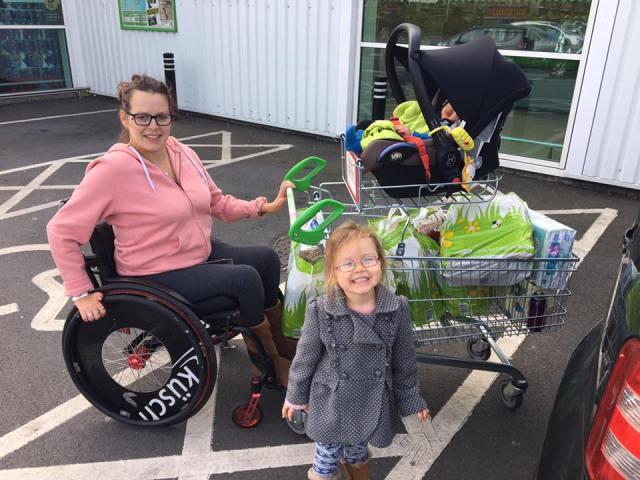
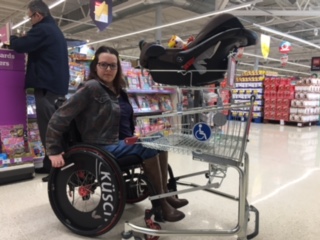
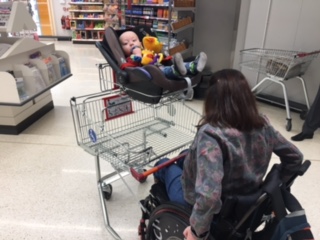
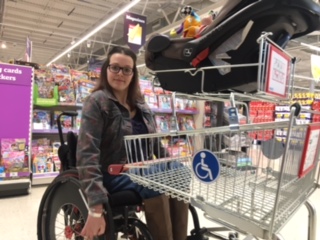
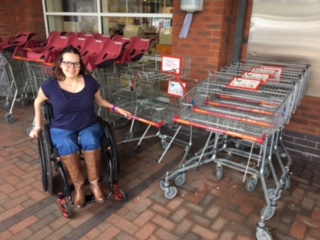





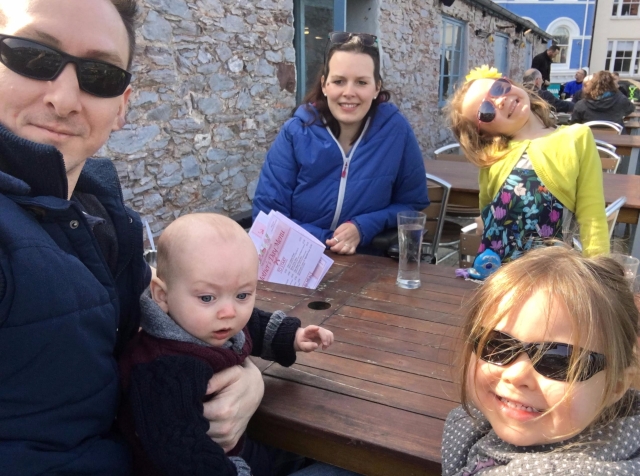
It’s Mother’s Day in the UK today, and there’s lots I could talk about when it comes to being a mother.
I have three kids, ranging in age from 6 years to 7 months, with 3-year-old in the middle. When I was first pregnant with child #1, it was exillerating, exciting, scary, and new. Nothing had been experienced before except through observing other pregnant people around me, but nothing was to prepare me for what was really to come. Six and a bit years on, I’m still pretty much winging it at times, with the occasional moment of knowing what I’m doing.
With my eldest when she was a baby, I worried about everything – whether she had fed enough, whether she was putting on weight quickly as she was a tiny baby, whether I was doing the right thing by feeding her and putting her down, and letting her cry – because she’d fed and her nappy was fine so what else could she need at 2am apart from sleep? She surely had to understand as early as possible that cuddles and attention in the dark hours was not going to happen. Some people I spoke to agreed, and had similar sleep routines, and some had different opinions on how much attention a baby needs after feeding and changing had been sorted. I was pretty sure we were doing it right, although it was nightmarish at times and we were both shattered. But when we considered the alternative – co-sleeping or something similar and in the attachment aisle of the parenting shop. We got though the baby stage and came out the other end with a baby who slept quite reasonably by the middle of her second year of life and we had our nights back.
Then we had the sensible idea to bring another screaming human science project into our house. ‘We know what we’re doing….maybe’, we both thought at times, and we often heard people say something like ‘oh you must know what you’re doing if this is your second baby!’ Nor necessarily true but I could kind of see where they were coming from. With the second baby some things are very familiar, and some things come back quite easily like breastfeeding, which my second daughter took to like a baby to a boob, with no issues whatsoever as opposed to the first time around where I stressed more than anyone needs to, over getting her to latch on properly, being scared by hospital staff that she’d need ‘topping-up’ with formula in ber first few hours of life as she had not had many long feeds from me. Nowadays I know that that particular bit of advice was unnecessary and I needen’t have worried about her not feeding enough right from the word ‘go’. Of course babies need to feed, and to increase their blood sugar, but considering that their stomach at birth is literally the size of a small marble, there really was no need for me to cry over the fact that she hadn’t guzzled all 2oz of formula after a 5 minute feed from me, only for her to throw it all up everyhwere after. I probably would have too if I’d been made to drink about 5 x the volume of my stomach in one sitting. So with daughter 2.0 this part of parenting was a lot less stressful. Don’t get me wrong, the times they throw up an entire boob of milk before bed when they’re bigger, is definitely a pain in the neck, and there were many rimes when I’d worry that she had not eaten enough, and slept too much, but for the most part, a lot more successful.
With daughter #2, I was also a bit more easy going when it came to sleep. I’d still want her back in her own bed after most feeds because it is my bed and I am selfish – but in the very early days and for the odd night thereafter if she spent most of the night in our bed, co-sleeping as they call it, then that was that. She’s 3 now and has been in her own bed sleeping perfectly normally for at least 2 years, only stopping our bedtime feed at 2.5. I knew we had approached sleep better this time around, but I do have a lingering guilt that in fact with our eldest daughter, she was not sleeping at all badly – she was a baby and babies wake and need a cuddle. The problem really was that we had been conditioned to believe that from a few weeks old babies should be able to sleep solidly. Complete rubbish.
Now I’m on child 3, this time of the male variety and pretty much every situation is sprinkled with a generous layer of salt, rathet than a pinch. He spends the first 2-3 hours in his cot and then camps next ro me with my boob in his face for the remaining 6-7 hours. We both sleep better than if he was going back into his cot after every feed, there is minimal night hour crying and despite my bedsheets smelling more sicky than I’d like, it works for now and I know that he will sleep just as well as his sisters in the next year or so. So whilst the reality at the moment is that I share my bed with a sweaty 20lb boy most of the night, with his Daddy the other side of me, I know that reality changes very often and soon it won’t be like that.
Six years on from my parenting birthday, I have come to realise that children are extremely cute as babies, even when they grin at you with your nipple clamped between their gums. They are cute at times over the next few years, interspersed with moments when they might behave like a complete A-hole, but also have the capability to make you feel more proud than you thought was biologically possible, like when you leave them at their school on the first day of term.
How on Earth did we make it this far? I cannot for the life of me keep a house-plant alive, and I even managed to mess up growing my daughter’s pumpkin seeds that she won in school – but somehow, between me and my partner, we have managed to grow three complete children. They’re exceptionally good looking, fantastically irritating at times, but they’re ours, and we grew them.
We are not by any stretch of the imagination experts in raising babies despite having three insisting that they live in our house. Each and every day I have moments where I shout at them to get their shoes on instead of routing through the bag of never-played-with tat destined for the charity shop and I think to myself ‘shit, that was harsh, I’m really crap at this today’, or times when all I want to do is watch a BBC drama containing strong language througout, and these two girls just sit there on the sofa looking at me like ‘wtf are we going to enjoy about this?’ and I have to consider what is more important – my anticipation of finding out who killed Kay in ‘The Replacement’ or my darling children’s quality time with Mummy? Of course, it was spending precious moments drawing stickmen with the girls and laughing at their farts – that is until I got bored and tasked them with sorting out the shoe box so I could finally watch the last 3 minutes of this crime-drama really quietly and sat ridiculously close to the TV so the children didn’t start repeating obsceneties.
I’m not sure if I’m done having babies, if we might like to add another in a few years. Either way, the baby stage take:3 is rapidly reaching the end of the first year and whilst a relief, it is also tragic and sad that there will be a time when he has his last feed from me, and one day he too will no longer need to ride on Mummy’s wheelchair because he’s tired of walking. I’m enjoying being a mum, even if I don’t always feel like a mum when I can’t do something for them, and even if I have a habit of spending the first few months after habing a baby being a miserable slug. I know now that that is ok, and every othe mum should know that too.
You are allowed to be a miserable slug, shout at your kids ‘KEEP YOUR TEETH TOGETHER FOR CRYING OUT LOUD’ when brushing their teeth, and feed them hot cross buns and popcorn and claim it as a reasonable dinner. You are shattered, look like crap and lose the will to live every hour pretty much. But you are their mum and they won’t remember all this rubbish stuff. They’ll remember you reading them ‘What The Ladybird Heard’ without even needing to see the book because you are a seasoned pro, and they’ll remember getting into bed with you in the morning because you are the perfect bookend to their wake and sleep routine.
They probably won’t remember the times you measured their height and weight, and wiped away their snot for a photo so they’d sell quicker on eBay.
HAPPY MOTHER’S DAY.
Yesterday I wrote an article about Accessibility for DisabledGo, you can read the article below or click here to view it on their website.
Access to life….
For as long as I can remember, the word ‘accessible’ has been such a frequent word in my vocabulary. It’s not the most exciting or tantalising word, but it is a word that I can imagine most people only associate with a primary-school spelling test; ‘is it one S or two?’ Or noticing a sign on a shop door allowing ‘guide dogs only’, regardless of the shop staff’s own awareness of impairments.
The definition of accessible is that something can be reached or attained. How accessible is our society for the majority of people? I’d say pretty accessible – I’m not for a moment suggesting life is easy, but you finish school and go to the same college as your friends, you skip lectures to go to Burger King for lunch instead, and then you catch a bus home and watch MTV all afternoon while your parents think you’re at lectures. Then if you’re lucky, you’ll get good enough grades to go to uni pretty much anywhere in the country, and that means you could pick any course that you qualify for, knowing that the only test of your limitations will be whether you’re too hungover to sit an exam on a Monday morning.
But for someone with a severe physical disability, this isn’t how the stereotype goes. If you’re able to study what you want to in school (see my post about how this might not happen) you might go to college and study what you’re interested in, albeit with tedious roadblocks along the way, like whether the carer that college has provided for you will let you use the iron in textiles class, even though you’re 17 and know that you’re quite capable of not scalding yourself whilst ironing a piece of material. The attitudes aren’t always accessible, and stereotypes mixed with ignorance compliment this. Whilst the other students in your English Language class sit in groups of quickly-made friends, you sit at the edge because it’s the most ‘accessible’ table, as far as positioning a wheelchair goes. As far as feeling equal to your peers and always having someone to chat to about the coursework, sitting nearest the door in every classroom was not the most accessible place. Kids like to huddle in the corner together and laugh about what they’ve drawn on their maths book, they don’t like to be in the place where everyone can see what you’re up to. Uni isn’t always accessible either. Before I started uni, we had to argue with several of the accommodation team that the room wasn’t big enough for me to move my wheelchair around in, and as they had extended a room for another student in a wheelchair, we argued that they could do the same for me. Then at the end of my first year of uni, the porters tried to fine all 6 of us in the apartment for damage to the kitchen involving the fire extinguisher being taken off the wall, and one of the flat-mates climbing in and out of the window for convenience. Didn’t he realise there was a handy door at the front of the building? I of course denied any wrong-doing as far as kitchen windows and extinguishers were concerned, but I secretly quite liked that the uni had the audacity to try and charge me for it. Ironically that was quite inclusive of them. Either that or they just didn’t think and automatically charged us all. I’d like to think it was the former.
Like all teenagers, when uni finishes you have to think about growing up, which involves finding a job. Finding an accessible job is almost impossible for someone like me however, and despite having A-Levels, a degree and a post-grad qualification meaning I can teach early-years, I will always need a lot of help in any job I do. This can include someone to help me go to the toilet – even a so-called accessible toilet isn’t accessible when you can’t do your own jeans button up, and I don’t want to live in tracksuit bottoms when I have no intention of running a half-marathon in the same day. I recognise that this is a specific need that can’t easily be met without someone helping me, but to be asked to schedule your own toilet-trips when the local care-trust are working out how much personal-care you need for *toileting* (one of the most impersonal and ugly words in the world – at what stage of adolescence and disability does going for a wee become ‘toileting’?) is particularly inhumane and soul-destroying. I can’t describe the feeling of being thirsty and wondering if you should have a glass of water or cup of tea or if it’ll make you need to go again too soon, before your PA is scheduled to come back to you again. This is not an accessible way to live.
Neither is wanting desperately to go somewhere with other people who are able-bodied, and knowing that you cannot because the physical structure of the location won’t allow for it. I’ve been to newly built places and wondered how on Earth their accessibility-surveyors signed-off their facilities as meeting criteria. For instance late last year I was shopping with my friend and my newborn baby, and we went to the baby change/feeding room to change his nappy. They had a lovely comfortable and quiet area for breastfeeding mums, and out of curiosity I wheeled myself towards the door to look inside, only to find I could not get into the room. The doorway was unnecessarily narrow and there was no way it was regulation for either the modern or old-school requirement of doorway width. I then got in contact with the store, which is an internationally known brand, and then later met with somebody who tries to ensure their stores are inclusive of people with disabilities – even he couldn’t understand why the doorway was so narrow. This just proved that although the intention might be there from some areas of our world, the promises of being accessible don’t always stretch to something as simple as a breastfeeding room or a changing table that you can reach from a wheelchair. I expect the numbers of breastfeeding mums who also happen to be essential wheelchair users and who shop in that store, are so low it didn’t even enter the consciousness of the people who built the facilities to make them accessible from a wheelchair. However, the store has excelled in their idea of accessibility in other areas. Their accessible toilets are not only more spacious than I’ve usually found, but where possible there’s a choice of two rooms – one with a toilet on the left and one with a toilet on the right. Because guess what, people’s physical capabilities and needs are never the same as the next person with a colostomy bag or a wheelchair. Even something as simple as offering two layouts of toilet facility can make access to normal life, so much more attainable.
I could go on for days and days about accessibility, because it is not just about ramps or extended tap handles or braille on café menus (imagine that) it goes so much deeper, it is so vast and it affects just about everything. I’m lucky that the man I choose to share my life with is pretty strong and when we are faced with somewhere than I can’t easily access in my wheelchair, he will lift me out of my chair and into the restaurant for example, or he’ll lift my chair up so a few steps won’t stop us enjoying being somewhere. But it can’t always work that way and of course he’s not there for everyone else needing his muscular help!
So in order to make our beautiful world open to everyone who needs and wants to experience it, we need to look at what ‘accessible’ really means and who it affects. And then start the small task of making it right.
I’ve thought hard about writing this piece. The last thing I want is for it to sound like a disabled person droning on about something unfair that happened to them as a child or growing up. At the time I didn’t realise quite what it meant, but in hindsight, some people made some very unfair decisions.
You’re 14, and suddenly you have to choose your GCSE subjects (these are the compulsory exams children take in schools in the UK at age 15-16 that determine what college *high school* and subjects they can take in post-16 education, which subsequently determines which degree subject you go and study for, which in turn is likely to determine the kind of career you might go into) it doesn’t always work out quite like that though, and your career may have nothing to do with the subjects you chose to study as a teenager. Normally we might choose between languages like French, Spanish, German and Latin, between humanities like History, Religious Studies and Geography, and design subjects like Art, Food Technology, woodwork, electronics, metalwork and graphic design for example. Subjects like Maths, English and Science are compulsory, which is a good thing, although I’d like to think in the future young people would appreciate their free education at a young age enough not to feel like they’re being ‘forced’ to study for a Physics GCSE.
When it came to choosing my own GCSEs, there was a conversation which I think went something like this:
Head of Humanities: “Elizabeth, as you are aware the coursework project for Geography GCSE takes place, as it has done for many previous years, at Kynance Cove. This is a very rocky inaccessible beach, so basically you won’t be able to do the Geography GCSE”
Me: “…….um Okay…”
Or words to that effect. I guess that wasn’t really a conversation though, was it? Like I said before, I didn’t really notice what had just happened, at age 14. I had just been told that I wouldnt be able to do an entire GCSE because the couresework involves trips to Kynance Cove, which is beautiful I hear, never been there though personally. So given that we had to pick two humanity subjects out of three available, there wasn’t much of a choice. There wasn’t a choice at all, I would have to study History – The Industrial Revolution – and Religious Studies – not even one of the pretty colourful religions either, just Christianity and its musty damp churches. I think we only went on one school trip for RS, to visit a ridiculously tiny Church that I could barely move around in. And I do appreciate now that the Industrial Revolution was quite, um, influential and important, but at the time I wasn’t particularly bonded with the subject, although I do have the name ‘Eli Whitney’ and his Cotton Gin forever etched in my memory.
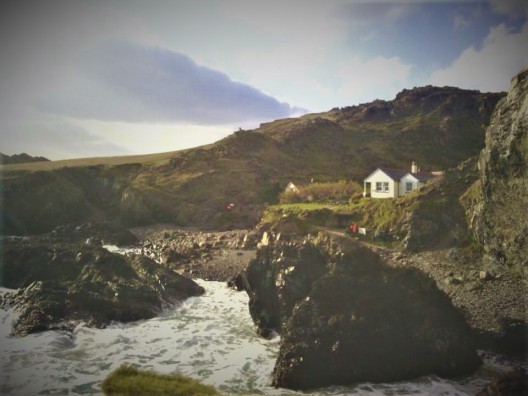
The elusive Kynance Cove – Photograph by Hannah Blandford, one of my school peers
That wasn’t the end of the story though. When it came to the design subjects, I was told I wouldn’t be able to pick anything except Food Technology and Art, as the other subjects were too risky for me to possibly be involved in, despite having been in those classes for the first 3 years of secondary school, and I didn’t die then. I’m not quite sure why they came to this decision either, as I usually had an adult helper with me in lessons which involved me needing physical help (as I did in Food Tech and Art also, but I guess I was less of a liability with a spatula than a soldering iron) so it puzzles me as to why my school wouldn’t allow my helper to ensure that I’d be safe in these lessons in order for me to do a Graphics GCSE for the final 2 years of school for example.
Oh but that’s still not the whole story. Way back when I first started secondary school at the tender age of almost 12, I remember being quite excited that my mum had bought me the school PE (Phys Ed) kit, which consisted of a navy blue pleated skirt, I think, and a white collored t-shirt. Not very exiting you might think but it was an improvement on the itchy black leotard and plimsol days of Primary School. Ahead of what I guess must’ve been my class’ first PE lesson, I was told that instead of doing the same activities like running, long-jump, netball and even contemporary dance etc with the rest of my female peers, I’d be doing separate things with my helper. We’d spend a while in the basketball courts trying to beat my own records of bouncing a basketball, and at other times in my first few years at school I’d go to a local hotel’s swimming pool with my helper. Swimming was and still remains a good exercise for me as I can move about a lot more freely in the water, and the perks of my Dad being a Naval Officer meant as kids me and my brother had regular swimming lessons which I loved. However, this still meant I was separated from my peers and my two good friends whilst they were together playing team games and practicing for Sports’ Day, which I was never involved in for the 5 years of secondary school.
There were other times that I didn’t get to do what everyone else had the option of doing – like going on trips abroad with the school – there was a residential trip in year 6 that I couldn’t go on, and I guess we just went along with the advice from the headteacher that it’d be too difficult. I did get to go to France at the end of Year 7 though, which I loved but that was the only trip I went on. I’m pretty sure there was a skiing trip at some point, and whilst I cannot ski, well in the traditional way anyway, I’m sure I’d have liked to have tried para-skiing, or just been strapped to an inflatable doughnut an released down a mountain, whichever. But of course it wasn’t even considered that these kind of monumentous trips abroad could include a disabled student, regardless of whether or not I could ski. It would’ve been nice to go and watch and be with the other kids. Or maybe the trips abroad could’ve included more cultural adventures rather than extreme sports in order to make more events more inclusive of students with differing abilities.
The problem for mainstream schools though, is that disabled students are always the minority. So any resources and funds put in place in order to make subjects and extra-curricular activities available to all students, probably get forgotten about. Imagine if schools had a clunky old racing wheelchair, or a stool for people to sit to throw a javelin, or students’ classmates all got excited at the idea of racing their paralysed classmate down a snowy hill in toboggans. Everyone has to put up with past-it sports equipment, almost chopping their fingers off whilst using an electric wood cutter, and getting homesick whilst away with school, it shouldn’t be any different for disabled kids in mainsream education.
I’d like to think that things are different now than back in 1998 when the internet was too young for new ideas to spread and attitudes didn’t change as fast as they can do now. If you’re the parent of a disabled child, please don’t settle for being told your kid can’t be the next David Attenborough just because the curriculum might contain things they’ll find physically difficult or even impossible. Insist that they change what can be changed.
I completely regret not having been able to study Geography, I loved it for the first three years of secondary school and I know I would’ve continued to enjoy it. I’m fascinated by our world and how it formed and is still changing, and that 12-year-old girl who was really proud of the cardboard model showing gradients of hills, really wishes she could’ve had some of the same adventures as the rest of the year-group when it came to exam years.

The cove last year, still being obnoxiously inaccessible. Photograph by Jolly Rogers, who has known me my whole life.
If you’re a teacher or a headteacher, or a head-of-department and you think there might be parts of the curriculum which aren’t within every student’s grasp, you can change it. And if you’re another disabled kid just like me, don’t be afraid to ask ‘why not?’. I didn’t, and I wish I had.